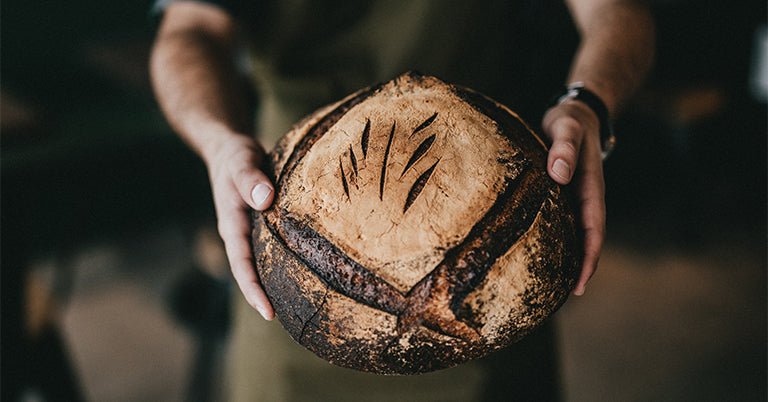Carbs, carbs, carbs. We talk about them all the time what are good carbs, what are bad carbs, carbo-loading, low-carb diets, no-carb diets, and so on. But can you actually answer the question, "What are carbs?" beyond simply pointing at the breadbasket in the center of your dinner table? Let's take a closer look to truly understand this key energy source and the essential differences between simple vs. complex carbs.
What are carbs?
Carbs (short for carbohydrates) are molecules made up of carbon, hydrogen, and oxygen atoms. Carbs are split into three categories: sugar, starch, and fiber. Each is designed to provide your body with energy the exact reason you're probably familiar with the term "carbo-loading" in sports. Athletes consume carbs in the build up to athletic events to increase energy and sustain performance.
But some carbs are better than others, commonly differentiated as simple vs. complex carbs.
What are simple carbohydrates?
Simple carbs are generally considered "bad carbs". Simple carbs are quick and easy to digest, providing a solution to flailing energy with a fast upward spike. If you're feeling run down (or lagging behind in a race) and need a quick pick me up, simple carbs will provide your body a fast and effective boost.
So what's not to love?
The flipside of simple carbs is that the fast fix is temporary, and often followed by an energy crash. Due to their simple molecular structure, simple carbs do not provide long-term energy. They also contain little in the way of nutritional value (i.e. empty calories). For these reasons, in the battle of simple vs. complex carbs, complex carbs are the clear winner.
Here is a sample list of simple carbohydrates
-
Candy
-
Pie
-
Soda
-
Cereal
-
White breads
-
Desserts
Note that most fruits are also considered simple carbs because they are rich in fructose (fruit sugar); however, fruits can be a bit tricky when it comes to carbs. While some fruits are indeed high in fructose (a simple sugar), they also come packed with fiber, vitamins, and antioxidants. This fiber content slows down the absorption of sugar into the bloodstream, preventing the energy crash you get with other simple carbs.
So, most fruits are complex carbs thanks to the fiber. Here's a rule of thumb: the more intense the color of the fruit, the higher its nutritional value.
As for portion size, moderation is key. Aim for 1-2 servings of fruit per day. A serving size is typically about the size of a small apple or orange.
What are complex carbohydrates?
Complex carbs are widely considered "good carbs‚" and yes, the more complex the carb, the better it is for you. Complex carbs are usually high in fiber and starches, which have more staying power in your body and therefore provide more sustained energy than simple carbs.
Complex carbs are critical to athletic performance, and have inspired the practice of "carb-loading." When athletes carb-load which they might do for a few days before an important race, or within 30 minutes before a tough workout they concentrate on their complex carb intake to ensure lasting energy for a longer period of time. Complex carbs are the best possible fuel for sports of any kind, as your body can store them and convert them into a slow-release, steady energy source.
Here is a sample list of complex carbohydrates:
-
Whole Grains
-
Beans
-
Certain Veggies (broccoli, peas, spinach)
-
Certain Fruits (bananas, grapefruit, apples)
-
Sweet Potatoes
-
Corn
-
Pastas
What is a good balance of carbs for your diet?
As a general rule, 45-65% of your caloric intake should come from carbs, most of which should be complex carbs. If you can limit the amount of refined foods you eat and focus on consuming mostly whole grains and other foods from the complex carb examples above, you'll garner greater nutrient value and assure a steady flow of energy to fuel your athletic activities and everyday adventures.
FAQ:
What about processed whole grains? Are they considered complex carbs?
Processed whole grains can be a bit of a gray area. While they still contain some fiber and nutrients, processing can remove some of the good stuff. Highly processed whole grains like some breakfast cereals may also be loaded with added sugars and unhealthy fats.
Stick to minimally processed whole grains like brown rice, quinoa, oats, and barley for the maximum benefit. Look for labels that say "whole grain" and avoid anything with added sugars or refined grains listed high in the ingredients list.
What are some tips for incorporating more complex carbs into my diet?
Here are some easy ways to add more complex carbs to your daily routine:
- Swap your morning refined cereal for oatmeal or whole-wheat toast with avocado.
- Brown rice instead of white rice is a simple change with a big impact.
- Snack on fruits and vegetables with hummus or nut butter.
- Trade white bread for whole-wheat wraps or lettuce wraps for your lunch sandwich.
- Incorporate complex carbs into every meal. Add beans or lentils to soups, stews, and salads.
- Choose whole-wheat pasta over refined pasta options.
Remember, complex carbs are your body's long-term energy source. By making small changes and incorporating these tips, you can fuel your body for a healthier and more energetic you!


Leave a comment
All comments are moderated before being published.
This site is protected by hCaptcha and the hCaptcha Privacy Policy and Terms of Service apply.